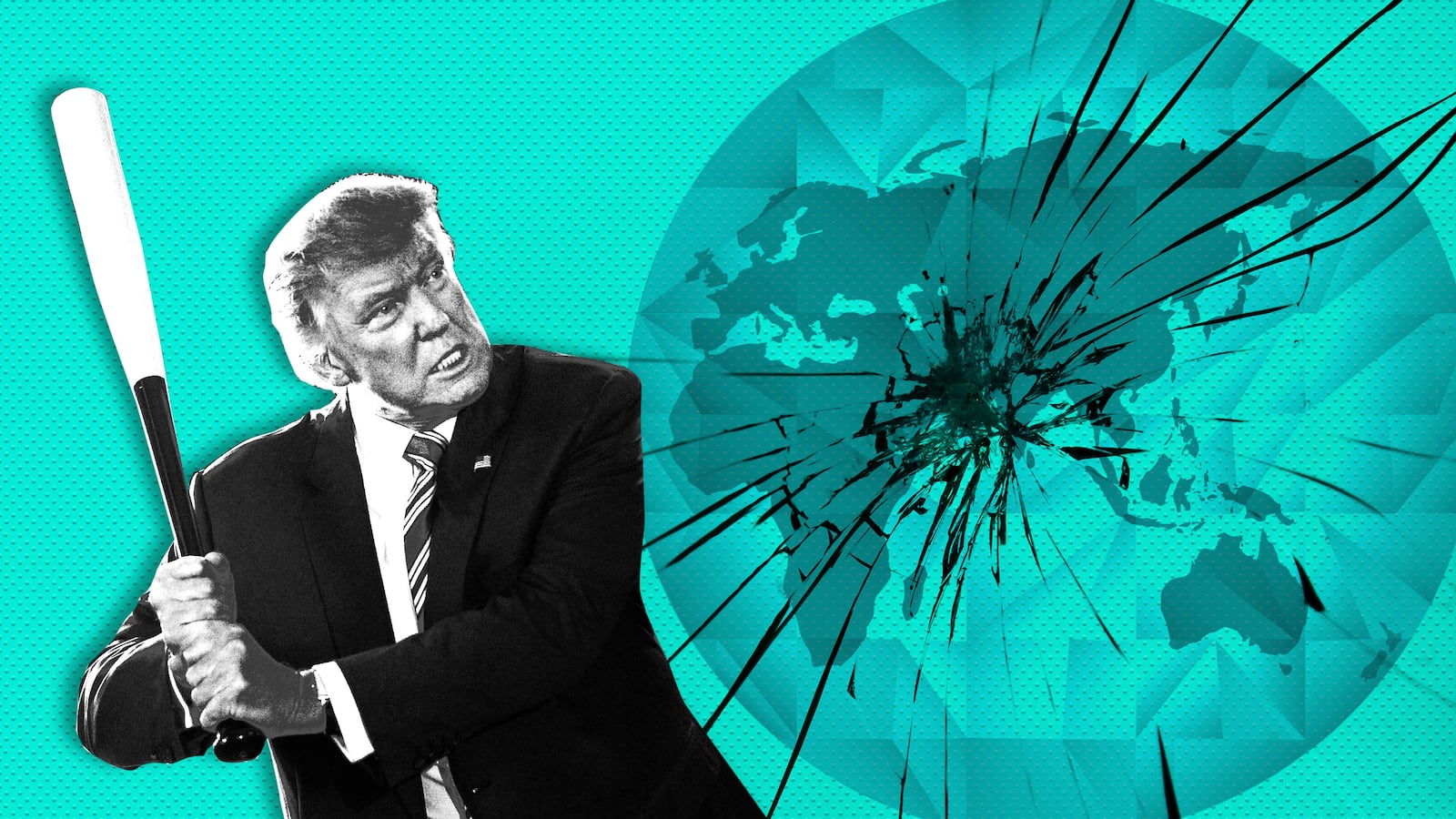PARIS—Modern Europe—liberal, democratic Europe—is a creation of the United States. This story was once known to every American, but as the generation responsible for this achievement dies, it seems this knowledge is no longer passed down.
The United States built the modern order upon an architecture of specific institutions: the United Nations, the International Monetary Fund, the International Court of Justice. In Europe, it built NATO and the European Union. This global order is in many respects an empire—a Pax Americana—but it is far more humane (in Europe, at least) than the European empires that preceded it.
The statesmen who built this global order were animated by two beliefs, one idealistic, the other realistic. The first belief: certain moral values are universal, and liberal democracies best reflect and cultivate those values. The second: in international affairs, anarchy reigns. Power is the only coin that matters.
Post-World War II Europe was designed by the United States to be the other half of the West, and Europe’s success since 1945 has been a global advertisement for liberal democracy. The collapse of liberal democracy in Europe would represent the failure of our own ideals. The collapse of European security would mean the end of liberal democracy.
Today, neither Europe nor the United States are wealthy or powerful enough, alone, to sustain and expand liberal democracy in a world increasingly dominated by China, Russia, and anarchy. No European country alone, nor any of the American states alone, can maintain the liberal global order. A United Europe, however, and the United States, are together strong enough to sustain and expand the liberal tradition and democratic values. This is precisely why the enemies of liberal democracy are determined to drive a stake through our alliance.
The pacification of Germany was the greatest of American achievements. This is what made European peace and integration possible. Germany’s demilitarization ended the Franco-German rivalry that set the Continent alight and reduced it to ashes again and again.
The wars that broke out in 1939 and 1914 were iterations of the wars fought by Bismarck, Napoleon and Louis XIV—Sedan, 1870; Leipzig, 1813; Jena, 1806; Austerlitz, 1805; Valmy, 1792; Turckheim, 1675. The 20th centuries’ wars were bloodier for only one reason: a massive improvement in killing capability. What would the next iteration of this war look like considering the technology we’ve got now?
Europe was cursed, for millennia, by internecine slaughter and butchery. For centuries, it was the world’s leading exporter of violence. That is precisely why our postwar foreign policy was designed to ensure our permanent military hegemony over the Continent. American power put an end to centuries of European war. Only American power, as we exercised it, could have done so: No other nation was capable of playing this role. No other nation would be capable of it now. No other continental country has the world’s largest GDP and a population of over 325 million, and no other country had—or has—enough distance from Europe to do it.
Postwar, Europe ceased to be the world’s leading exporter of violence because it was stripped of full sovereignty and subordinated to outside hegemons—first the U.S. and the USSR, then the U.S. alone.
We ended the bloodshed by credibly guaranteeing Germany’s security under the American nuclear umbrella. The long peace is the direct consequence. The benefits of this—to the U.S., Europe, and the world—are not just economic, although those benefits are immense. The benefits are in wars not fought, lives not squandered.
European free-riding isn’t an anomaly or a trick, as many Americans now seem to believe—it’s the central feature of our postwar security strategy. How is it, then, that suddenly, we’ve become consumed with rage that Europe is “taking advantage” of us? How have we forgotten that this is the point of the system? We designed it this way, and did so for overwhelmingly obvious historic reasons learned at incalculable cost.
Since World War II, we have been deployed in Eurasia to ensure the continent cannot be dominated by a single power capable of monopolizing its resources and turning them against us. We do this by suppressing security competition. We build overwhelmingly massive military assets and locate them, strategically, as a warning: “You cannot win. Don't even try.” By this means, we prevent local arms races before they begin. We say, simultaneously, “But there is no need to try. Your safety is guaranteed. You need not worry about this.” And we regularly show—often at terrible risk to ourselves—that we mean it. This strategy has largely kept the peace in Europe for 74 years.
The United States underwrites European security through forward engagement and guarantees based on deterrence. In return, its allies accept the United States’ dominant role in the international system. They contribute—significantly, in both money and blood—toward meeting common challenges. Until now, our statesmen have had the good sense to allow all concerned to save face and to describe our relationship as a partnership, with each contributing according to ability. Unfortunately, it seems everyone who understood what this actually meant—European subordination to U.S. hegemony—is dead.
Yes, the U.S. does pay more than its “fair share.” In exchange it receives more than its fair share of power. All parties to the arrangement receive prosperity and peace. This arrangement liberated Europeans and Americans alike from the most dangerous force confronting them: European fratricide. But we have forgotten how it happened or why. We have forgotten that our grandparents are the ones who built NATO. We have confused “old” with “obsolete.”
We have forgotten that the our alliance with Germany was the foundational relationship of the postwar order. We have forgotten that the European Union was our vision. In 1964, Paul Hoffmann, who led the implementation of the Marshall Plan, put this plainly: “Those of us involved in the actual administration of the Marshall Program had very much in our minds the building of a new Europe. We had been persuaded by Jean Monnet and others that there was no hope for progress of a compartmentalized Europe and that in a postwar world, Europe’s future would be dim unless there was close cooperation among the Marshall Plan countries. Speaking personally, I thought that union would first come along economic lines and that some degree of political union was certain to follow.”
Americans died, suffered, and labored assiduously for generations to make of Europe what it had never been before: a united zone of peaceful, prosperous, liberal democracies—and the other half of the West. The rescue and reconstruction of Europe was our greatest moral and political accomplishment, towering above any other in our country’s short history. Our grandparents destroyed the most monstrous and tyrannical regimes humanity has known, then proved that our system of governance, or something much like it, could be built and made to work on that very soil. This is the story of the world we know, and the story of our country, too. This is the accomplishment now under threat.
We take it for granted. The United States seems so mammoth, so solid, so marmoreal that it requires immense imagination to recall that before our grandparents built this world, liberal democracy was a fragile and relatively untested experiment. It was our victory in the Second World War and our reconstruction of Europe and Japan that made us a global, norm-setting power—capable of defining the rules of international order. This is what made liberal democracy a global aspiration, and in many places, a reality.
The generation that saw the rise of Hitler and Stalin and saw, for themselves, the destruction of the World Wars, the failure of the squalid communist revolutions in Russia and China, and the genocide and enslavement over which these miserable regimes presided, were obviously, deeply traumatized—so much so that they assumed what they had seen was unforgettable. They imagined these events, like the Crucifixion, would become a permanent part of human memory.
They were wrong. We’re now cheerfully pissing away the greatest achievement of American history, the work of generations, achieved at incalculable cost in life and treasure: a free, united, secure, and prosperous Western world. The 20th century has been forgotten. No one learned a thing from it.
Claire Berlinski is a freelance writer who lives in Paris. She is crowdfunding her forthcoming book, The Rise of the New Caesars and the Death of Freedom.





